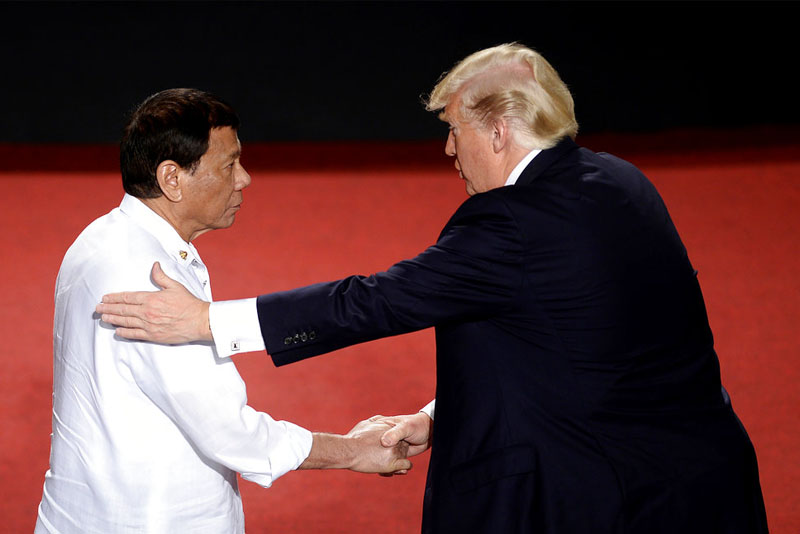Duterte-Trump ‘romance’ boosts Philippines-US ties

As a result of frank and frequent talks between Filipino and US officials, Harris said “we continue to maintain a robust defense relationship,” slowly expanding the parameters of military-to-military cooperation. Noel Celis/AP/File
WASHINGTON – Relations between the Philippines and the United States are on the upswing under the Duterte-Trump administrations, the head of the US Pacific Command said.
“The tenor of our bilateral relationship has improved over the past year, due in part to the relationship-reset in President Duterte’s personal interactions with President Trump,” Admiral Harry Harris Jr. said.
As a result of frank and frequent talks between Filipino and US officials, Harris said “we continue to maintain a robust defense relationship,” slowly expanding the parameters of military-to-military cooperation.
“In particular we have obtained a Philippine commitment to resuming live-fire exercises and close air support training,” he said in a statement at a House Armed Services Committee hearing on US military posture and security challenges in the Indo-Asia-Pacific region.
Before Trump came to office ties between both countries were at their lowest level because of human rights concerns.
The Obama administration repeatedly condemned Duterte’s war on drugs and the resulting deaths of countless Filipinos and Duterte retaliated with personal insults.
At one point Duterte called Barack Obama a “son of bitch” and threatened to abandon the Philippines’ alliance with the United States for one with China.
“Strategic patience has helped recalibrate the alliance relationship,” Harris said.
He said the attack on Marawi by Islamic State-inspired fighters posed a significant challenge to the Armed Forces of the Philippines (AFP) and served as a reminder of the value of our alliance to Philippine security and stability.
“US support, primarily in the form of providing intelligence, surveillance, and reconnaissance (ISR), tactical advice, and the use of our Mutual Logistics Support Agreement (MLSA) to assist in the timely delivery of weapons and ammunition, proved crucial in the AFP’s defeat of ISIS-P in Marawi,” he said
The Pentagon’s quick response to addressing AFP needs helped bolster the bilateral relationship, he said.
Referring to the South China Sea, Harris said overlapping and competing territorial and maritime claims remained a source of friction in the region.
“I am most concerned about China’s ongoing actions in the South China Sea,” he said.
“Across the South China Sea, China’s air force, navy, coast guard and maritime militia all maintain a robust presence. Routine patrols and exercises ensure Chinese forces are in and around all the features, not just the ones they occupy,” Harris added.
Aboard the USS Carl Vinson in the South China Sea, Rear Admiral John Fuller told reporters “US presence matters” in the disputed sea-lane. “I think it’s very clear that we are in the South China Sea. We are operating.”
The Carl Vinson, one of the US Navy’s longest-serving active carriers, is currently conducting what officials say is a routine mission through the hotly contested waters where years of island reclamation and military construction by
Beijing have rattled regional nerves.
Following criticism that the Trump administration’s commitment to the Asian region has been distracted by North Korea, reporters were flown onto the ship Wednesday as it sailed through the sea.
In a rapid series of takeoffs and landings, F18 fighter jets roared off the deck, accelerating from zero to 290 kilometers per hour in a dizzying two seconds.
“The nations in the Pacific are maritime nations,” he said. “They value stability ... That’s exactly what we are here for. This is a very visible and tangible presence. The United States is here again.”
Message to China
But the location of the strike group – which includes a carrier air wing and a guided-missile cruiser – is also a very direct message to China, whether US officials admit it or not.
Its voyage comes just a month after the Pentagon’s national defense strategy labeled China a “strategic competitor” that bullies its neighbors while militarizing features in the South China Sea.
Beijing claims most of the South China Sea – believed to hold vast oil and gas deposits and through which $5 trillion in trade passes annually – and has rapidly built reefs into artificial islands capable of hosting military planes.
The Philippines, Vietnam, Taiwan, Malaysia and Brunei also have claims in the sea.
Compared to the 11 active aircraft carriers in the US Navy, China currently boasts just one carrier.
But the rising Asian superpower has made no secret of its desire to build up its naval forces and become much more regionally assertive.
Last month Beijing said it had dispatched a warship to drive away a US missile destroyer, which had “violated” its sovereignty by sailing close to a shoal in the South China Sea.
Major naval nations like the US, Britain and Australia are determined not to let China dictate who can enter the strategic waters.
They have pushed “freedom of navigation” operations in which naval vessels sail close to Chinese-claimed militarized islets in the South China Sea.
“We will follow what international rule says and we will respect (it), even if there are disputes there,” Fuller said.
The nuclear-powered USS Carl Vinson – the ship that took Osama bin Laden’s body for burial at sea – began a regular deployment in the Western Pacific last month. – AFP
- Latest
- Trending






























